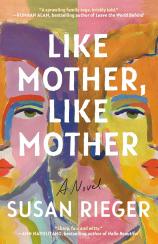Like Mother, Like Mother
Review
Like Mother, Like Mother
Here’s something fun to do: Pick up your copy of LIKE MOTHER, LIKE MOTHER at your favorite bookstore. Do your usual preliminary scan, read the front cover blurb, and check out Susan Rieger’s photo on the back. Then slyly slip to page 316 and read the last sentences of her Acknowledgements where she lists the sources of unattributed quotations that are buried in the conversations and commentaries. She dares her readers to identify them. Is that a trace of an e. e. cummings poem? Can you hear Humphrey Bogart’s voice in a moment from Casablanca? The awareness that each conversation might have its roots in our real world adds a little something to this already engaging novel.
Challenge accepted.
"The awareness that each conversation might have its roots in our real world adds a little something to this already engaging novel.... LIKE MOTHER, LIKE MOTHER sweeps aside some traditional assumptions of what makes a good mother and then presents other working models."
We meet many complex, vibrant characters in LIKE MOTHER, LIKE MOTHER, and of course we pay particular attention to the mothers. The first section is titled “Lila” and begins with her death in Washington, DC in 2023. Lila Pereira had been a brilliant executive editor of The Washington Globe. Her story lays the groundwork for the two other characters who are central to the novel: her mother, Zelda, and her youngest daughter, Grace.
When Lila was two years old, Zelda was institutionalized by her father. After a few months, she and her older siblings were told that their mother was dead. Lila would never see her again. The children had witnessed their father’s abuse of their mother, and now he focused his anger on them, with the worst of the beatings saved for Lila. Her isolation from others, as well as her physical and psychological exploitation, caused anger, fierce independence and persistent questioning of why Zelda had abandoned her. She never found an answer.
Lila’s ascent into the lofty world of news and power begins as she conquers Ivy League schools and tackles entry-level positions in the publishing world and the still-tangible bias against women in the late 1900s. She marries Joe, the nicest guy in the world, who becomes the best dad in the world with the birth of their daughters. Lila wraps herself up in her excellent work. Rieger’s characters spar with one another, using literary references, citing news situations and personalities, and writing about the political machinations of the day. A reference to His Girl Friday, the 1940 film set in a newsroom, is particularly apt.
The book’s second section is named for Grace, and the focus moves to the 2000s and her development as a writer, following in her mother’s footsteps but still choosing her own way. Grace writes a novel about her family, but the “fictional” situations and characters are easily identified. She had been given little information about her grandmother, but she sees how Zelda’s abandonment of her children has affected Grace’s life, even many years later.
“Zelda” is the final chapter and occurs after Lila’s death. Grace seeks answers and a believable resolution to the question of what exactly happened to her grandmother. With the help of her husband, her sisters, many friends and DNA testing, she finds clarity.
Back to the Acknowledgements and the casual search for a familiar idea. Perhaps you caught a nod to Hunter S. Thompson or Shakespeare. No matter the success rate, please remember that this book is written as a roman à clef. It is hard to draw a line between the truth as a remembered experience (which happens with the political issues of the last decades) and the truth as Rieger writes it. Even a hint of a memory from another sphere is disconcerting.
LIKE MOTHER, LIKE MOTHER sweeps aside some traditional assumptions of what makes a good mother and then presents other working models. The characters first must reckon with the identity and actions of the mothers who came before them. Then they have to determine if those truths matter now. Do those stories shape who they are today? It’s a question worth their time to ponder, and it’s a question worth our time to consider.
Reviewed by Jane T. Krebs on October 30, 2024
Like Mother, Like Mother
- Publication Date: November 11, 2025
- Genres: Fiction, Women's Fiction
- Paperback: 352 pages
- Publisher: Dial Press Trade Paperback
- ISBN-10: 0525512519
- ISBN-13: 9780525512516




